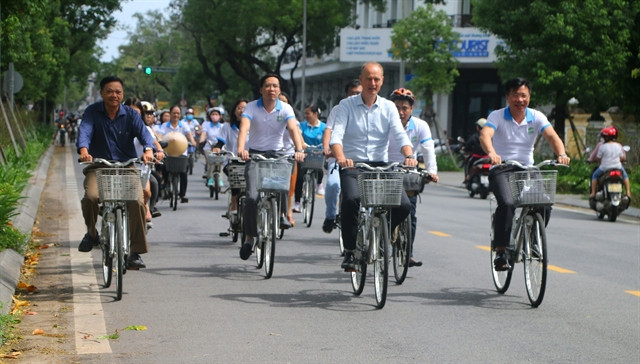 Bicycles are a favourite way of getting around in Hue. The city plans to turn green traffic. Photo courtesy of UNDP
Bicycles are a favourite way of getting around in Hue. The city plans to turn green traffic. Photo courtesy of UNDPThe plan was discussed at a recent workshop on 'Electric traffic contributes topromoting the development of green Hue city' that was organised by the ThueThien - Hue Institute for Development Studies (HueIDS), the provincial women'sunion and UNDP.
At the workshop, participants shared local authorities' national strategies andpractical contributions. In addition, they introduced pilot activities toencourage the transition to cleaner modes of transport as well as opportunitiesand challenges, solutions and initiatives in supporting the development ofelectric and green transport in turning Hue into a sustainable local.
The development of electric vehicles towards green traffic development in Hue cityhas been seen as a positive solution in implementing the public transportproject that the province and UNDP have been focusing on.
The transportation sector is one of the sectors that use fossil fuels and emitlarge greenhouse gases in the Vietnamese economy. Therefore, the Government of Vietnamhas approved the transport sector's action programme on green transformationand carbon and methane reduction, with the overall goal of developing a greentransport system. By 2050, Vietnam intends to strongly implement this shift inthe direction of 100% of road vehicles being electric.
"We always look forward to learning about electric transport models ofcountries around the world, the orientations and goals of the Government aswell as pilot models deployed in Vietnam to be able to learn and implement in ThuaThien - Hue", Phan Quy Phuong, Vice Chairman of provincial people'scommittee said.
Speaking at the workshop, Patrick Haverman, Deputy Resident Representative ofUNDP in Vietnam, emphasised that 'Green transport offers the potential to bethe mode of transport of the future in realising Hue's long-term goals onlow-carbon urban development.
Hue city needs construction planning with an overall green transportdevelopment plan that integrates with other development activities, in whichappropriate roadmaps and infrastructure networks are needed. Traffic needs tobe designed to be integrated and friendly to the environment. At the same time,it is necessary to develop an institutional and policy framework formanagement, operation and encouragement of greening initiatives. Stakeholderengagement and consideration of policies across different sectors are importantfactors contributing to the sustainability of green transport solutions,increasing urban accessibility, and increasing urban mobility market anddeveloping solutions to promote electric traffic."
This seminar is part of the project 'Promoting the sustainable transition ofelectric traffic in Vietnam' supported by the Government of Japan, which aimsto reduce greenhouse gas emissions through improving policies, environment forelectric transport development at the national level and implementation ofpilot activities on promoting electric traffic in Hue city.
Hue City has launched the first phase of the Public Bike Sharing System – aninnovative public bike-sharing scheme by the International Co-operation Agencyof Germany (GIZ), tech firm Vietsoftpro and the central provincial people'scommittee – has been launched in Hue city to develop a bicycle transportationplan for 2021-2026.
The pilot project used 80 bicycles for seven stations in the inner city anddestinations along the Huong River in the first phase before expanding to 19 or20 stations with a total of 500 bicycles in 2023.
The Public Bike Sharing System will help visitors and residents access publicbicycles in the wider smart city concept for turning Hue city into a low-carboncity.
It is also expected to improve physical and mental health and quality of lifein Hue, a UNESCO-recognised world heritage site and tourist attraction./.



























